Search
Showing 1 - 20 of 20 results
 News
News
Study Finds Paxlovid Treatment Does Not Reduce Risk of Long COVID
A team of researchers from UC San Francisco has found that Paxlovid (Nirmatrelvir-ritonavir) did not reduce the risk of developing long COVID for vaccinated, non-hospitalized individuals during their first COVID-19 infection.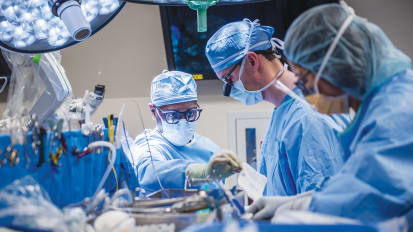 News
News
Minimally Invasive LITT Effective for Recurrent Glioblastoma: A UCSF Case Study
A 65-year-old woman with a small focal recurrence of glioblastoma was treated with laser interstitial thermal therapy (LITT) at UCSF nearly five years after her first tumor resection surgery.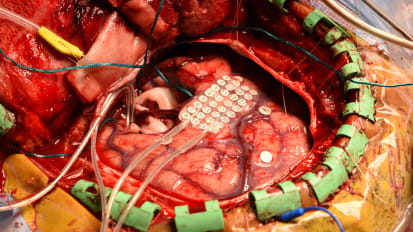 News
News
Cerebral Cavernous Malformation Treatments Relieve Disparate Symptoms
Two patients with severe yet different neurological symptoms were referred to UCSF for emergent neurosurgical evaluation. Both were found to have previously undiagnosed cerebral cavernous malformations (CCMs), but each patient’s treatment was unique. News
News
Positive Patient Outcomes With Minimally Invasive Skull Base Surgery: UCSF Case Studies
The following case studies describe how Ezequiel (Eze) Goldschmidt, MD, PhD, and the UCSF Brain Tumor Center team used the EEA to successfully remove different types of tumors, including a pituitary adenoma, a craniopharyngioma, an epidermoid cyst and a chondrosarcoma.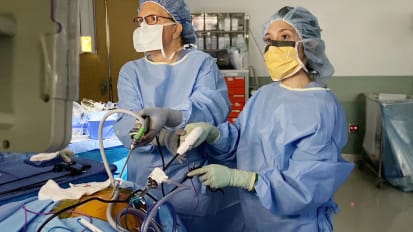 News
News
UCSF Case Study: Same-Day Discharge After Pheochromocytoma Removal
San Francisco endocrine surgeon Sanziana Roman, MD, performed a posterior retroperitoneoscopic adrenalectomy (PRA) to remove a pheochromocytoma. This approach enabled the patient to be discharged home within hours of surgery and avoid prolonged hospitalization, thereby minimizing COVID-19 risk. News
News
Patients with Intractable Headaches Find Relief at the UCSF Inpatient Headache Unit
UCSF Inpatient Headache Unit treats patients with headache disorders through intravenous infusions of medications such as dihydroergotamine, chlorpromazine and valproate. Patients experiencing frequent and severe migraine, cluster, post-traumatic and other headaches have had their pain alleviated through this service, which is offered by the UCSF Headache Center.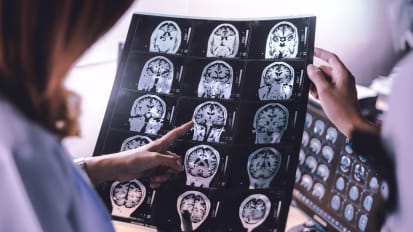 Document
Document
Referral Guide for Physicians - Neurology and Neurological Surgery
Referral and specialty care clinic information provided by UC San Francisco’s departments of Neurology and Neurological Surgery.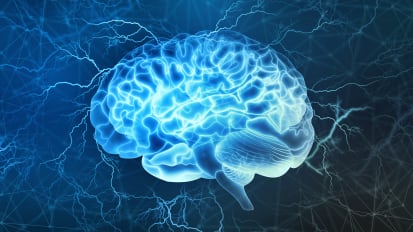 News
News
New Complex Neurology Program Focuses on Hard-to-Diagnose Cases
In an effort to find answers to some of the most daunting neurological puzzles frustrating patients and clinicians alike, UC San Francisco has opened the Jan and Maria Manetti Shrem UCSF Neurology Complex Diagnosis Clinic, an innovative multidisciplinary center that tackles these issues head-on. Document
Document
Headache Center Fast Track Checklist
As the only program with an Inpatient Headache Treatment Unit in Northern California, UCSF’s Headache Center helps improve the quality of life for individuals suffering from debilitating headaches. Video
Video
Sudden, Severe Headaches: Responding to the Thunderclap
Extreme headache pain that comes on abruptly (the “thunderclap”) can signal a number of serious conditions – such as subarachnoid hemorrhage – or have a simple cause such as sexual activity or a change in medication.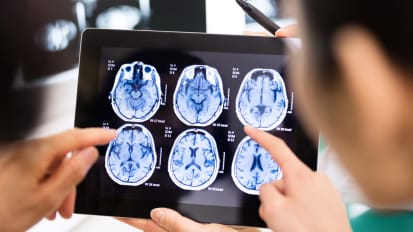 News
News
Optimizing Care Following Traumatic Brain Injury: Rapid Laboratory Test Offers Opportunity for Paradigm Shift
The Centers for Disease Control and Prevention (CDC) estimates that there are approximately 2.5 million traumatic brain injury (TBI)-related emergency department (ED) visits annually. Recent media coverage has focused on the occurrence of TBI in professional sports, but the reality is that the impact of TBI-related morbidity extends beyond high-level athletics. Video
Video
Headache Help: Making Sense of Migraines and a Multitude of Therapies
Neurologist Morris Levin, MD, director of the UCSF Headache Center, reviews the diagnostic criteria for migraines and other headaches, followed by a breakdown of preventive and acute treatments. Video
Video
Look Beyond Symptoms: When to Test for Pituitary Tumors
Tumors of the body’s “master gland” cause various symptoms – headaches, depression, sexual dysfunction, vision loss – that doctors often attribute to other conditions. UCSF endocrinology and neurosurgery specialists discuss keys to identifying patients as well as the merits of telehealth referrals in the time of COVID.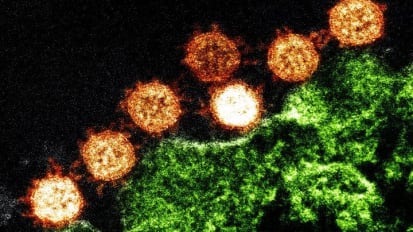 News
News
As Mysterious Coronavirus Spreads, An Infectious Disease Expert Explains What You Should Know
A new coronavirus, related to the SARS and MERS diseases that have caused epidemics, has been discovered in China and started to spread.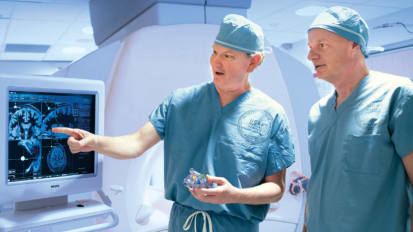 Document
Document
Neurology and Neurological Surgery Services
Our internationally renowned centers, clinics and programs deliver compassionate clinical care while accelerating advances in the diagnosis, treatment and prevention of complex disorders of the brain, spine and peripheral nervous system. Video
Video
Headache Update - Module 1
Our headache expert summarizes, simplifies and lists on-screen the primary headaches defined by the International Classification of Headache Disorders, including migraine, tension-type, cluster, and exertional headache, and introduces three case studies. Video
Video
Headache Update - Module 2
Here’s a guide to secondary headaches caused by trauma, infection, intercranial pressure, and more, including red flags for when to investigate further. Headaches related to vascular disorders, for example, can be dangerous and require early diagnosis. Video
Video
Headache Update - Module 3
Learn how migraines begin and develop in the brain and how various treatments – from antiepileptics and triptans to beta blockers and botox – can prevent or relieve pain at different stages. Also: strategies for weaning patients off medication overuse. Video
Video
Headache Update - Module 4
See the latest treatments for migraines (some not on the market yet), including lasmaditan (a serotonin 1F receptor agonist), DHE via inhalation and medicines to block CGRP. Plus: infusions for refractory headaches, intractable primary headaches and more. Video
Video
Headache Update - Module 5
Explore three case studies: An overscheduled high school student with menstrual headaches, a tech company CEO with daily headaches and medication overuse, and a man in his 60s with limited treatment options due to diabetes and other health concerns.


